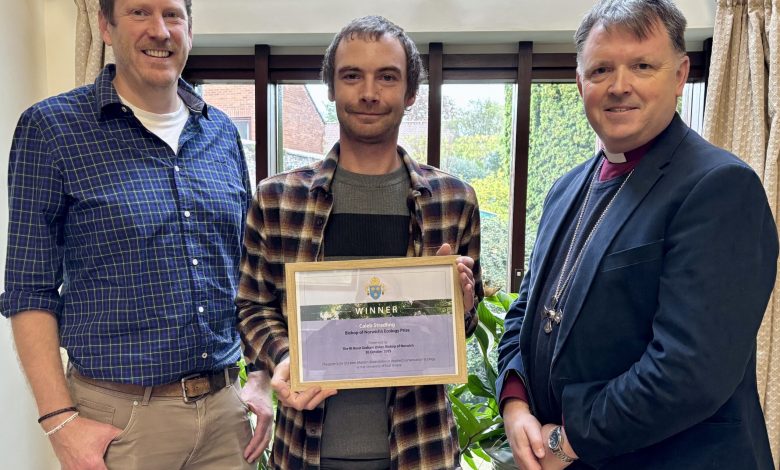Curlews help UEA student win annual Bishop of Norwich Prize for Ecology

Student’s Research on Nesting Curlews Wins Prestigious Ecology Prize
Caleb Stradling, a 34-year-old student from the University of East Anglia, has been awarded the prestigious Bishop of Norwich’s annual Ecology prize for his outstanding research on nesting curlews. The £1,000 prize recognizes the student with the highest marks for a masters dissertation in applied ecology and conservation. Stradling’s work has focused on analyzing how vegetation and agricultural practices affect curlew survival, addressing critical concerns about this endangered bird species. His research not only earned him academic recognition but has also had practical applications in conservation efforts. The Right Reverend Graham Usher, Bishop of Norwich and the Church of England’s lead bishop for the environment, emphasized the importance of such research from a spiritual perspective: “As a Christian it is my calling to care for God’s creation, and it is a privilege to be able to support this kind of research. Caleb’s work is giving curlews the best chance of survival and helping make it possible that generations to come will be able to delight in the beautiful curlew call.”
Stradling’s journey into curlew conservation began with his passion for birds, which eventually brought him to Norfolk. During his studies, he connected with accomplished ornithologists at the University of East Anglia, deepening his knowledge and research capabilities. His fascination with curlews developed while working with an organization dedicated to saving these birds from extinction. “I became enchanted by the curlew and its evocative bubbling song,” Stradling explained. His research addresses a critical conservation challenge: land-use changes have resulted in habitat loss and degradation, putting additional pressure on the already-vulnerable breeding cycle of curlews. In many regions, these birds are not producing enough offspring to maintain their populations, pushing them closer to extinction. Stradling’s work aims to reverse this trend by identifying key factors affecting their reproductive success and developing targeted conservation strategies.
Following his academic success, Stradling has transitioned to a full-time position with Curlew Country in Shropshire, where he’s applying the analytical skills developed during his master’s program to real-world conservation efforts. The impact of his work is already evident in the organization’s recent achievements: “Happily, we have had a successful year all round for the project with five chicks fledging in the wild, in addition to releasing 37 head-started curlews to reinforce the population,” Stradling reported. This combination of natural breeding success and supplementation through “head-starting” (raising eggs or chicks in captivity before release) represents a significant boost for curlew populations in the region. Beyond his primary research, Stradling has also developed a passion for bird ringing (banding birds for identification and tracking), an additional skill that enhances conservation monitoring efforts. He plans to invest part of his prize money in equipment for this complementary conservation activity.
The Bishop of Norwich’s annual Ecology prize, sponsored by the Anne French Memorial Trust, does more than recognize academic excellence—it provides tangible support for early-career conservationists who often face financial challenges while pursuing their passion. Professor Simon Butler, course director for the MSc in Applied Ecology and Conservation at the University of East Anglia, highlighted the significance of the award: “The award is a really valuable recognition of our students’ hard work. It means a lot to students who often put themselves into quite challenging financial positions in order to progress in this kind of career.” This acknowledgment of the financial sacrifices made by conservation students underscores the importance of prizes like this in supporting the next generation of ecological researchers and practitioners who might otherwise struggle to continue their vital work.
The collaborative nature of this conservation success story illustrates the power of partnerships between academic institutions, religious organizations, and conservation groups. Bishop Graham Usher, who studied ecology himself before entering the clergy, represents a growing recognition within faith communities of environmental stewardship as a spiritual responsibility. The Anne French Memorial Trust, which sponsors the prize, supports various initiatives across Norfolk, including the ministry of the Bishop of Norwich and projects that benefit the community. This intersection of faith, education, and conservation exemplifies how diverse sectors can come together to address pressing environmental challenges. The University of East Anglia’s program in Applied Ecology and Conservation provides the scientific foundation and research methodology, while organizations like Curlew Country offer practical field experience and implementation of conservation techniques.
Stradling’s research and subsequent conservation work represent hope for the future of curlews in Britain. These iconic birds, known for their distinctive long, curved bills and haunting calls, have experienced severe population declines across much of their range. By identifying specific factors affecting their nesting success and implementing targeted interventions, conservationists like Stradling are developing evidence-based approaches to reverse these declines. The combination of scientific research, practical conservation work, and public engagement demonstrates a comprehensive strategy for species recovery. As Professor Butler noted, many who enter this field do so “for the public good,” motivated by a desire to protect biodiversity for future generations rather than personal gain. The recognition provided by awards like the Bishop of Norwich’s Ecology prize validates this commitment and encourages continued efforts in the challenging but essential work of conservation. Through the dedication of researchers like Caleb Stradling, there’s renewed hope that the evocative bubbling song of the curlew will continue to grace Britain’s landscapes for generations to come.







